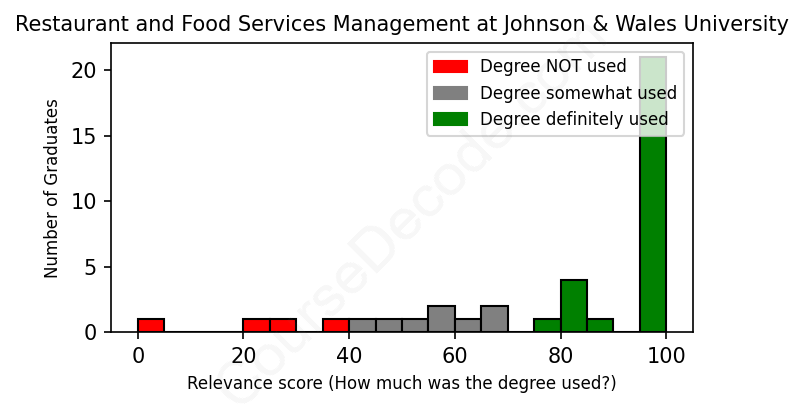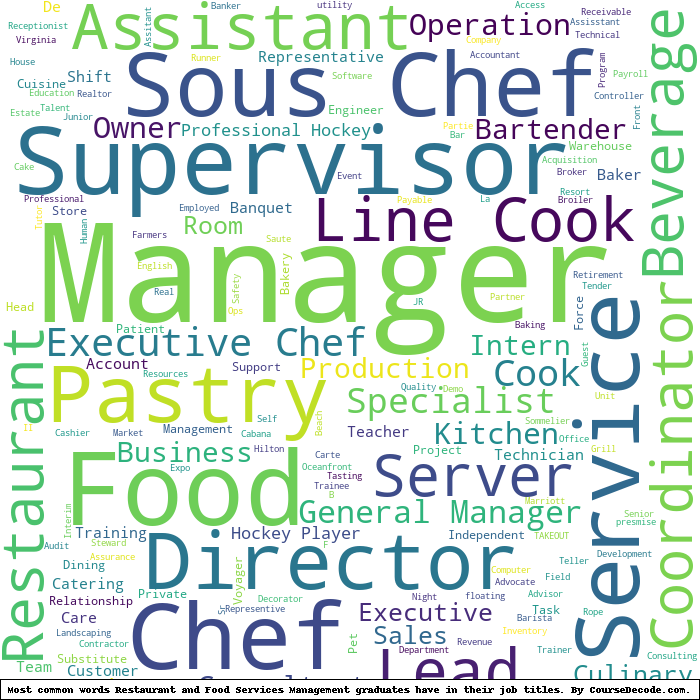
First, some facts. Of the Restaurant and Food Services Management graduates from Johnson & Wales University we've analyzed , here's how many have used (or NOT used) their degree in their career:

These are estimates based on AI analysis of 39 LinkedIn profiles (see below).
The verdict? Significantly above average. Overall, with an average relevance score of 80%, Restaurant and Food Services Management graduates from Johnson & Wales University have a much higher likelihood (+13%) of finding work in this field compared to the average graduate across all fields:
And for comparison, here's the chart for all profiles we've looked at across all degrees.
Also, after graduating, only 15% of these graduates have pursued further education other than another Bachelor's degree (such as a Masters degree or other), compared to the average across all profiles of 35%. This suggests a Bachelors degree is enough for most Restaurant and Food Services Management graduates, and it's normal to look for work straight after graduation.
See the details:
|
Relevance score: 23% We think this person has NOT gone into a career related to their degree. We think this person has NOT gone into a career related to their degree.
DEGREE INFOGraduated in 2019 from Johnson & Wales University with a Bachelor of Science - BS in Restaurant and Food Services Management. Also pursued further education since (see below). JOB HISTORY SINCE GRADUATIONLead Project Coordinator | Warehouse Manager Technology Integration Group Jun 2020 - Nov 2021 Landscaping Specialist  Mr. Tai Lawn & Garden Services Oct 2021 - Aug 2022 Customer Relationship Advocate  Fidelity Investments Aug 2022 - Oct 2023 Retirement Representive  Fidelity Investments Oct 2023 - Present FURTHER DEGREES DONE SINCE GRADUATINGMaster of Business Administration - MBAJohnson & Wales University 2016 - 2020 ABOUTHungry for experience and success! I am looking for opportunities and ready contribute where ever I can. One of my core values is hard and honest work, it is what drives me to reach my goals. I am a hard worker and I love to learn, if you are willing to give me a chance or willing to teach me, I'm ready to listen!I enjoy adventuring out of my comfort zone to try, learn, and experience new things whether if it's traveling or food/drinks and business opportunities. |
The top 10 most common jobs done by the graduates we've analyzed (ranked most common to least) are:
After analyzing the job trajectories of graduates from Johnson & Wales University with a degree in Restaurant and Food Services Management, it's clear that many have pursued careers that are closely aligned with their academic studies. The most common positions include roles like Executive Chef, Food and Beverage Manager, and various sous chef and kitchen management positions. These roles directly leverage the culinary and operational skills learned during their degree program, emphasizing not only cooking techniques but also important aspects of restaurant management, customer service, and food safety. Interestingly, many individuals have climbed the ranks in the culinary world, starting from cooks to higher managerial positions, which indicates that the degree provides a solid foundation for career advancement in the food services sector.
However, not all job placements align perfectly with the degree’s focus. Some graduates have taken paths that seem to stray far from restaurant management, such as positions in sales, teaching, or unrelated fields. These roles do not typically require the specific skills and knowledge gained from the Restaurant and Food Services Management curriculum. As a result, while many graduates are successfully channeling their education into relevant careers, there's a notable handful that have found themselves in jobs that don't necessarily connect to their studies. Overall, graduates tend to find relevant roles, particularly within culinary and operational management, but there are exceptions where graduates venture into unrelated fields.
Here is a visual representation of the most common words in job titles for Restaurant and Food Services Management graduates (this is across all Restaurant and Food Services Management graduates we've analyzed, not just those who went to Johnson & Wales University):

Graduates from Johnson & Wales University's Restaurant and Food Services Management program appear to have a pretty solid career trajectory, especially in the first few years after graduation. Most of them start off in kitchen roles, like cooks or sous chefs, which gives them a great grounding in the culinary side of the industry. As time goes on, many of these graduates move up to higher management positions in food and beverage operations. For instance, common roles five to ten years down the line include executive chefs, restaurant managers, and food service directors. It's clear that those who stick with the food service industry can successfully climb the ladder into management positions.
However, not every graduate stays in the food service field long-term. While many continue to thrive in related roles, some find themselves pivoting into completely different careers or industries, as seen with graduates who have dabbled in real estate or education. That said, the majority still seem to maintain some connection to food services or the hospitality industry, indicating that their Johnson & Wales education provides a solid foundation, even if they explore other paths. Overall, it looks like a degree from this university opens up a variety of doors, with a significant number of graduates finding success in the culinary and hospitality sectors.
So, a Bachelor’s degree in Restaurant and Food Services Management at Johnson & Wales University can actually be a pretty manageable ride, especially if you're passionate about food and the hospitality scene. The coursework involves a mix of practical skills, like cooking and event management, alongside some business and management classes, which can be fun and hands-on. It's definitely not a walk in the park—there will be challenges and late nights, especially during projects or busy seasons. But if you're organized and enjoy collaborating with others, it can feel easier than some other intense degrees. Plus, the environment is usually pretty supportive and geared towards helping you succeed, making it a good choice if you're into this field.
Most commonly, in the LinkedIn profiles we've looked at, it takes people 2 years to finish a Bachelor degree in Restaurant and Food Services Management.
Looking at these graduates from Johnson & Wales University and their job histories, it seems like some of them have navigated their way to decent pay, especially those who moved up the ranks to roles like Executive Chef or Food and Beverage Manager. People who stayed in the kitchen or entry-level positions like cooks might not be pulling in huge salaries, but they still have stable jobs in the food industry. Meanwhile, some grads have taken a more entrepreneurial route or stepped into management, which could lead to better earnings over time, especially with experience and the right connections. Overall, it looks like there’s a mixed bag when it comes to making decent money in this field, but hard work and good decision-making can definitely pay off!
Here is a visual representation of the most common words seen in the "about" section of LinkedIn profiles who have a Bachelor degree in Restaurant and Food Services Management (this is across all Restaurant and Food Services Management graduates we've analyzed, not just those who went to Johnson & Wales University). This may or may not be useful:

Here are all colleges offering a Bachelor degree in Restaurant and Food Services Management (ordered by the average relevance score of their Restaurant and Food Services Management graduates, best to worst) where we have analyzed at least 10 of their graduates:
| College | Score | Count |
|---|---|---|
 Johnson & Wales University Johnson & Wales University
|
80 | 39 |